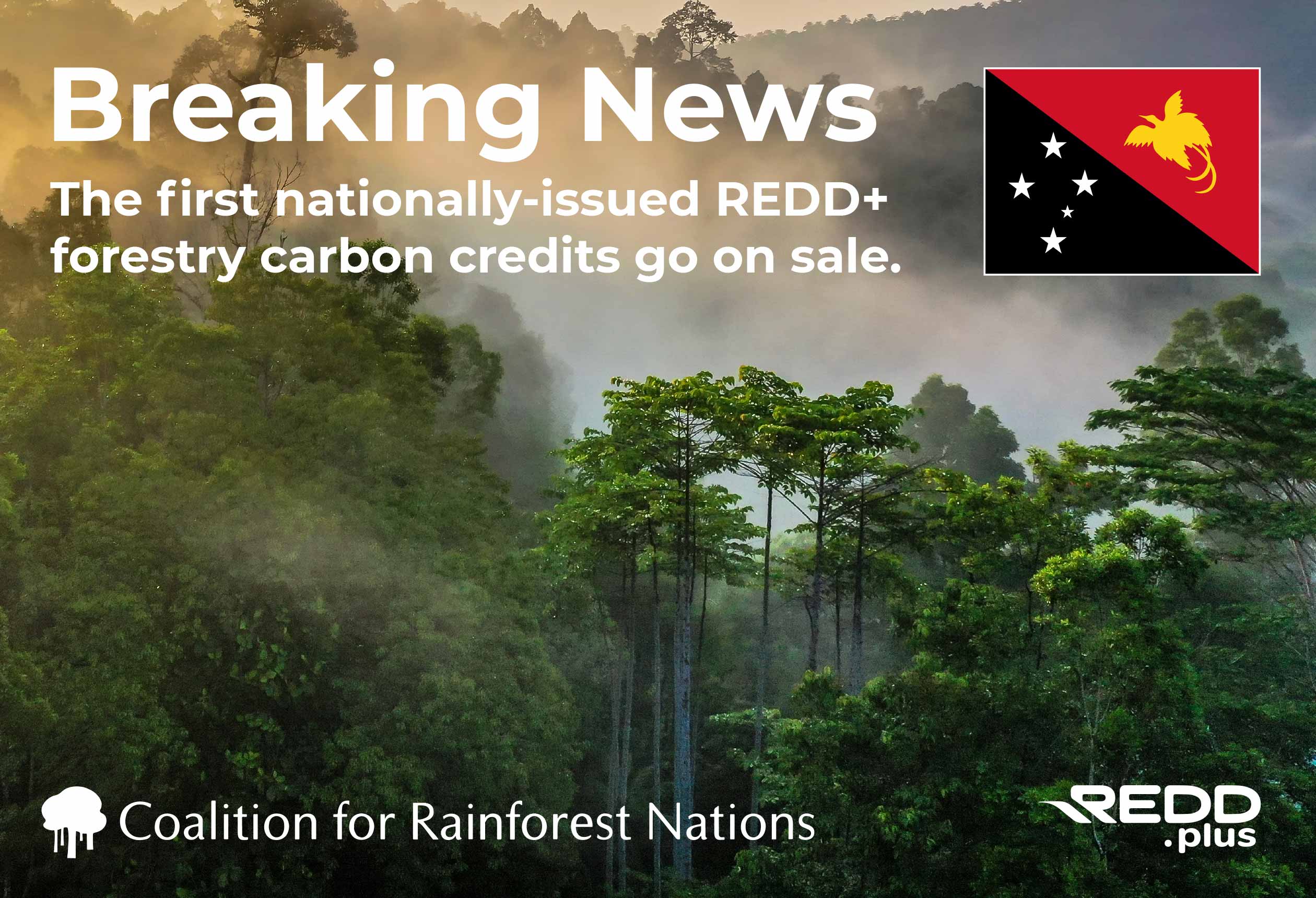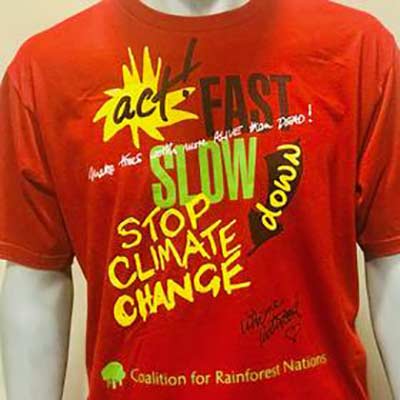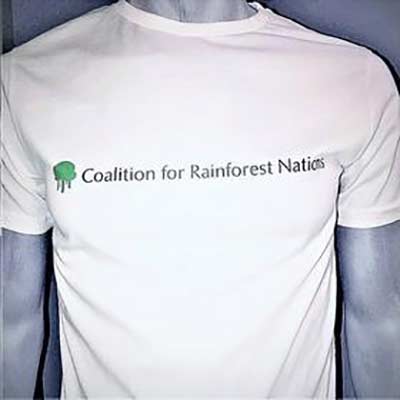
News: Papua New Guinea Slows Rainforest Deforestation after a Decade, According to New UNFCCC Report
Nine million UNFCCC-verified, forestry carbon credits issued for sale by sovereign government.
March 30, 2021, Port Moresby, Papua New Guinea
Papua New Guinea's rainforest conservation efforts successfully slowed the pace of deforestation in 2014-2015, after bringing annual deforestation levels down to an annual average of 0.5% over a thirteen-year period, according to a report published by United Nations Framework Convention on Climate Change (UNFCCC). As a result of these efforts, UNFCCC verified 9 million metric tonnes (mt) of carbon reductions for this period. The results were posted on UNFCCC REDD+ Information Hub along with four other prerequisites to UNFCCC REDD+ verification:
- National REDD+ Strategy
- National Forest Reference Level
- National Forest Monitoring System
- Safeguards Information Summary.
Highlights:
- Deforestation: Between 2000-2013, Papua New Guinea saw an average loss of 0.5% of its national rainforest annually or 197,000 hectares of forest. The highest annual deforestation figures came in 2013 with a loss of 39,676 hectares. Loss was primarily due to conversion of forests to croplands for both non-commercial agricultural needs of its population (63%) as well as commercial agriculture (30%).
- Degradation of remaining rainforests, primarily for commercial logging was also a major concern. Peaking in 2012 with 240,000 hectares, government action led to steadily declining degradation from 2013 onwards. 2014 and 2015 showed a marked decline in deforestation in both drivers.
- Reforestation and forest rehabilitation activities: Conversely, efforts to enhance forest cover through reforestation and forest rehabilitation activities were limited, despite ambitious goals set out within Papua New Guinea's Vision 2050 to establish 800,000 hectares of forest plantation by the middle of this century.
"These results are a testament to over two decades of national action and leadership - and are a fitting and timely tribute to the late Sir Michael Somare who pioneered global rainforest conservation. The data from 2014-2015 clearly show that Papua New Guinea has now turned a corner in our battle to stop deforestation," said, Ruel Yamuna, Managing Director of the Climate Change and Development Authority.
Papua New Guinea's 9 million mt of carbon reductions will become the first nationally issued REDD+ forestry carbon credits to go on sale to corporations and consumers. This comes after a decade of international negotiation to establish Reducing Emissions from Deforestation and Degradation and the role of conservation, sustainable management of forests and enhancement of forest carbon stocks in developing countries (REDD+) as a global conservation mechanism under the Paris Agreement on climate change - which was achieved in 2015.
The REDD+ mechanism, the brainchild of late Sir Grand Chief Michael Somare - founding father of Papua New Guinea, was started by Papua New Guinea and the Coalition for Rainforest Nations in 2005 under the UN Framework Convention on Climate Change (UNFCCC). The government of Papua New Guinea intends to set up a national biodiversity and climate change trust fund to manage and distribute the wealth accumulated from the revenues of nationally issued REDD+ forest carbon credits and other grants and donations. This will be announced in PNG Parliament in April.
A signing ceremony of the Memorandum of Understanding (MOU) took place on Wednesday March 17 in Port Moresby between the government of Papua New Guinea and REDD.plus to permit the sale of the forest carbon credits. Wera Mori, Minister of the Environment, Conservation & Climate Change and Kevin Conrad, Chief Executive of REDD.plus signed the agreement.
"Today's agreement constitutes a significant milestone for the REDD+ story and for Papua New Guinea. People and companies will be able to purchase forest carbon credits that reward a country's successful conservation efforts as well as count towards the Paris Agreement and the global carbon budget," said Kevin Conrad, Executive Director, Coalition for Rainforest Nations. "Buying nationally issued REDD+ forest carbon credits is a powerful way to support global efforts to tackle the climate emergency."
While Papua New Guinea's nationally determined contribution under the Paris Agreement in which targets for emissions reductions in the land use and forest sector have not been identified beyond 2015, mitigation actions from its national policies, Vision 2050 and the Medium-Term Development Strategy 2030 have been set out.
Papua New Guinea's nationally issued REDD+ forestry carbon credits were made available for purchase today on REDD.plus registry - provided by IHS Markit and trading platform by CBL . REDD.plus is currently managed by not-for-profit, Coalition for Rainforest Nations.
About
Climate Change and Development Authority, Independent State of Papua New Guinea
The Climate Change Development Authority is mandated under the Climate Change (Management) Act 2015 with the responsibility to contribute toward global efforts in mitigating greenhouse gas emissions, through low carbon development that fosters economic growth and social welfare for the people's wellbeing and prosperity. It is based in Port Moresby, Papua New Guinea. Learn more at PNG REDD+
Coalition for Rainforest Nations
The Coalition for Rainforest Nations is US 401c3 not-for-profit established by forested tropical countries to collaboratively reconcile forest stewardship with economic development. Its assists tropical governments, communities and peoples responsibly manage their rainforests. It is the architect of the REDD+ mechanism and is headquartered in New York.
REDD.plus is the first digital platform enabling carbon neutrality under the Paris Agreement, and provided by IHS Markit and trading platform by CBL. It is a central registry and exchange for nationally issued carbon reductions or REDD+ Results Units from rainforest nations, certified by the United Nations. REDD.plus is owned and managed by the Coalition for Rainforest Nations.


